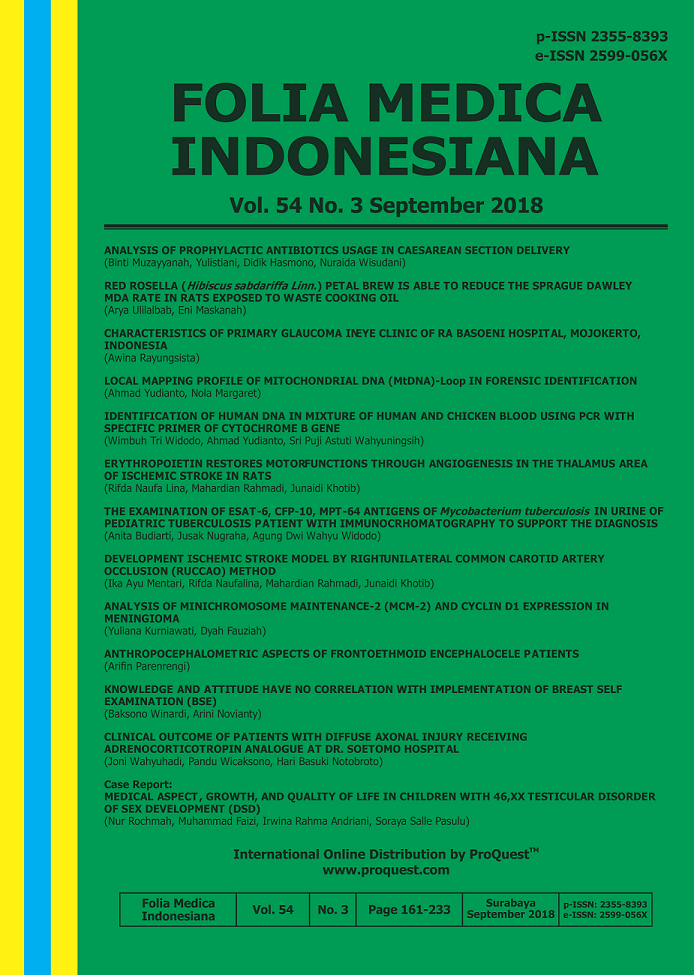Main Article Content
Abstract
This study aimed to know the existence of relationship between knowledge, attitude and implementation of BSE among midwifery students and mathematics students of Universitas Airlangga. This study used analytic observational method with cross-sectional approach. The sampling technique was the proportional sampling, consisting of 30 students of midwifery and 30 mathematics students. Analysis used was univariat and bivariat analysis with Spearman Rank. The significance level was 0.05 (5%). This study showed that 90% of midwifery students had good knowledge of BSE, 66.7% had sufficient attitude and 46.7% performed BSE in sufficient category. As many as 66.7% students of mathematics had sufficient knowledge about BSE, 63.4% had sufficient attitude and as many as 60% performed the BSE in the less category. The statistical test revealed p value = 0.267 for midwife respondents and 0.467 for mathematics respondents. Statistical test on the relationship between BSE attitude and implementation had p=0.100 for midwifery students and 0.407 for mathematics students. As a conclusion, there was no relationship of knowledge, attitude and implementation of BSE in the students of midwife and students of mathematics.
Keywords
Article Details
-
Folia Medica Indonesiana is a scientific peer-reviewed article which freely available to be accessed, downloaded, and used for research purposes. Folia Medica Indonesiana (p-ISSN: 2541-1012; e-ISSN: 2528-2018) is licensed under a Creative Commons Attribution 4.0 International License. Manuscripts submitted to Folia Medica Indonesiana are published under the terms of the Creative Commons License. The terms of the license are:
Attribution ” You must give appropriate credit, provide a link to the license, and indicate if changes were made. You may do so in any reasonable manner, but not in any way that suggests the licensor endorses you or your use.
NonCommercial ” You may not use the material for commercial purposes.
ShareAlike ” If you remix, transform, or build upon the material, you must distribute your contributions under the same license as the original.
No additional restrictions ” You may not apply legal terms or technological measures that legally restrict others from doing anything the license permits.
You are free to :
Share ” copy and redistribute the material in any medium or format.
Adapt ” remix, transform, and build upon the material.

References
- Audrina GW (2014). Faktor-Faktor yang mempengaruhi tingkat keberhasilan pemberian kemoterapi pada pasien penderita kanker payudara di RSUD Dr. Soetomo dengan menggunakan regresi logistik ordinal. Jurnal Sains dan Seni Pomits 3
- Baswedan RH, Listiowati E (2014). Hubungan tingkat pengetahuan tentang Pemeriksaan Payudara Sendiri (SADARI) dengan perilaku SADARI pada mahasiswi non kesehatan di Universitas Muhammadiyah Yogyakarta. Biomedika 6, 1-6
- Ekanita P, Khosidah A (2013). Hubungan antara pegetahuan dan sikap WUS terhadap perilaku pemeriksaan payudara sendiri (SADARI). Jurnal Ilmiah Kebidanan 4, 167-177
- Erbil N, Bolukbas N (2012). Beliefs, attitudes, and behavior of Turkish women about breast cancer and breast self-examination according to a Turkish version of the champion health belief model scale. Asian Pacific Journal of Cancer Prevention 13, 5823-5828
- Kocher A, Ertem G (2012). Breast self examination among nurses and midwife in odemis health districs in Turkey. Proquest. Indiaan Journal of Cancer
- Mubarak WI (2007). Promosi kesehatan. Yogjakarta, Graha ilmu
- Nugraheni A (2010). Hubungan tingkat pengetahuan tentang SADARI dengan perilaku SADARI sebagai deteksi dini kanker payudara pada mahasiswi DIV Kebidanan FK UNS. Unpublished Applied Science Paper. Surakarta, Faculty of Medicine, Universitas Negri Sebelas Maret
- Utami N (2007). Hubungan tingkat pengetahuan kanker payudara dengan perilaku pemeriksaan payudara sendiri (sadari) pada mahasiswi PSIK A FK UGM. Unpublished thesis. Yogyakarta, FK UGM
References
Audrina GW (2014). Faktor-Faktor yang mempengaruhi tingkat keberhasilan pemberian kemoterapi pada pasien penderita kanker payudara di RSUD Dr. Soetomo dengan menggunakan regresi logistik ordinal. Jurnal Sains dan Seni Pomits 3
Baswedan RH, Listiowati E (2014). Hubungan tingkat pengetahuan tentang Pemeriksaan Payudara Sendiri (SADARI) dengan perilaku SADARI pada mahasiswi non kesehatan di Universitas Muhammadiyah Yogyakarta. Biomedika 6, 1-6
Ekanita P, Khosidah A (2013). Hubungan antara pegetahuan dan sikap WUS terhadap perilaku pemeriksaan payudara sendiri (SADARI). Jurnal Ilmiah Kebidanan 4, 167-177
Erbil N, Bolukbas N (2012). Beliefs, attitudes, and behavior of Turkish women about breast cancer and breast self-examination according to a Turkish version of the champion health belief model scale. Asian Pacific Journal of Cancer Prevention 13, 5823-5828
Kocher A, Ertem G (2012). Breast self examination among nurses and midwife in odemis health districs in Turkey. Proquest. Indiaan Journal of Cancer
Mubarak WI (2007). Promosi kesehatan. Yogjakarta, Graha ilmu
Nugraheni A (2010). Hubungan tingkat pengetahuan tentang SADARI dengan perilaku SADARI sebagai deteksi dini kanker payudara pada mahasiswi DIV Kebidanan FK UNS. Unpublished Applied Science Paper. Surakarta, Faculty of Medicine, Universitas Negri Sebelas Maret
Utami N (2007). Hubungan tingkat pengetahuan kanker payudara dengan perilaku pemeriksaan payudara sendiri (sadari) pada mahasiswi PSIK A FK UGM. Unpublished thesis. Yogyakarta, FK UGM

